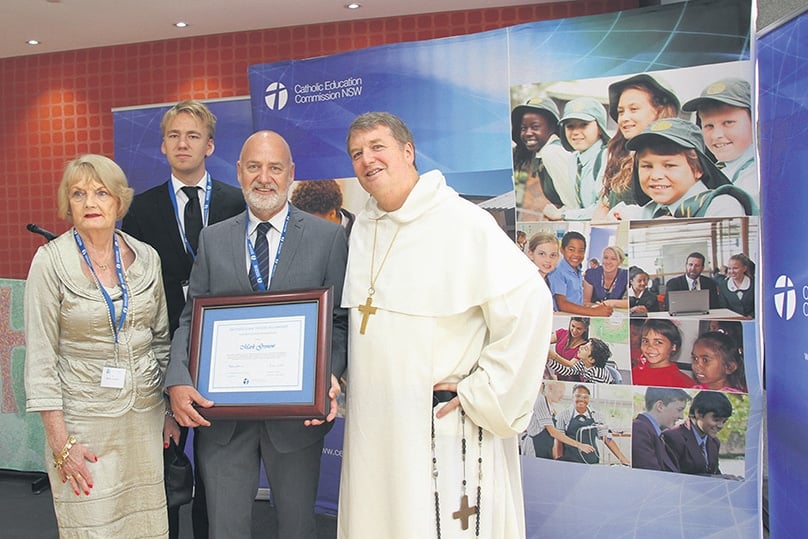
Mathematics teaching in Australia is stuck in a death spiral, says Mark Gronow, the inaugural recipient of the Br John Taylor Fellowship, and he is determined to help students and teachers break out of it.
The Archbishop of Sydney, Archbishop Anthony Fisher OP, presented Mr Gronow, the head of mathematics at Stella Maris College, Manly, with the $25,000 research award on 8 December.
The archbishop is chairman of the Catholic Education Commission of NSW, which created the fellowship to replace the Br John Taylor Award for Excellence (given from 1998-2013).
Mr Gronow, a teacher with 30 years’ experience in both city and regional Catholic schools, said his love of mathematics began with his father, who left school at 13 but would give his sons practical mathematical problems to solve.
“I know that getting to the heart of mathematics education is getting kids to understand the basic little problems they can solve themselves,” Mr Gronow said.
“And that’s the enjoyment of mathematics; that’s what makes people want to learn.”
Teachers had a “very heavy content-laden curriculum”, he said, a great challenge to get through before testing the students “to make sure they know what they are doing”.
“The result is is that they don’t know what they are doing.
“They get the test result. They end up failing and, of course, they just think ‘I can’t do this. I’m not good at maths.’
“But the reality is the foundations weren’t good to begin with and they’ve never been able to build on those foundations.”
In September, the Office of the Chief Scientist revealed that around 40 per cent of mathematics classes in Years 7-10 were being taught without a qualified mathematics teacher.
The declining number of tertiary students in the so-called STEM subjects – science, technology, engineering and mathematics – also remained a significant challenge.
“At the moment, our cycle is stuck. We’ve got no maths teachers, not teaching mathematics, kids not enjoying it and no-one going [on to university study in the area].”
His own understanding of how to teach students effectively was broader than simply imparting theoretical skill.
“Pedagogy is about being able to talk to the students about mathematics and understand how students learn mathematics and that’s including the engagement component, the effective learning, the emotion – ‘How do I feel about myself?’ – the self concept.
“These are integral to learning mathematics because if you can’t feel good about what you’re doing, you’re not going to be able to understand and then go on to learn it.”
Archbishop Fisher praised Mr Gronow for wanting to help achieve better student engagement with the discipline, “avoiding the great ‘turnoff’ that students sometimes experience because they feel they can’t succeed”.
With the award ceremony taking place on the Feast of the Immaculate Conception, he said the “quirky feast” was proof that “God cares intimately about us from the very moment that we start to be, to our very last breath and beyond”.
“In Advent, all creation, all humanity, all generations, wittingly or not, await the coming of [Mary’s] Son: God in the flesh; God made a baby,” Archbishop Fisher said.
“This event is the why and wherefore of all Catholic educational activities. All redeemed creation, all redeemed humanity, striving towards the full realisation of God’s kingdom, as Advent promises.”
Mr Gronow’s research will eventually be published on the Education Commission website as a resource for mathematics teachers.
